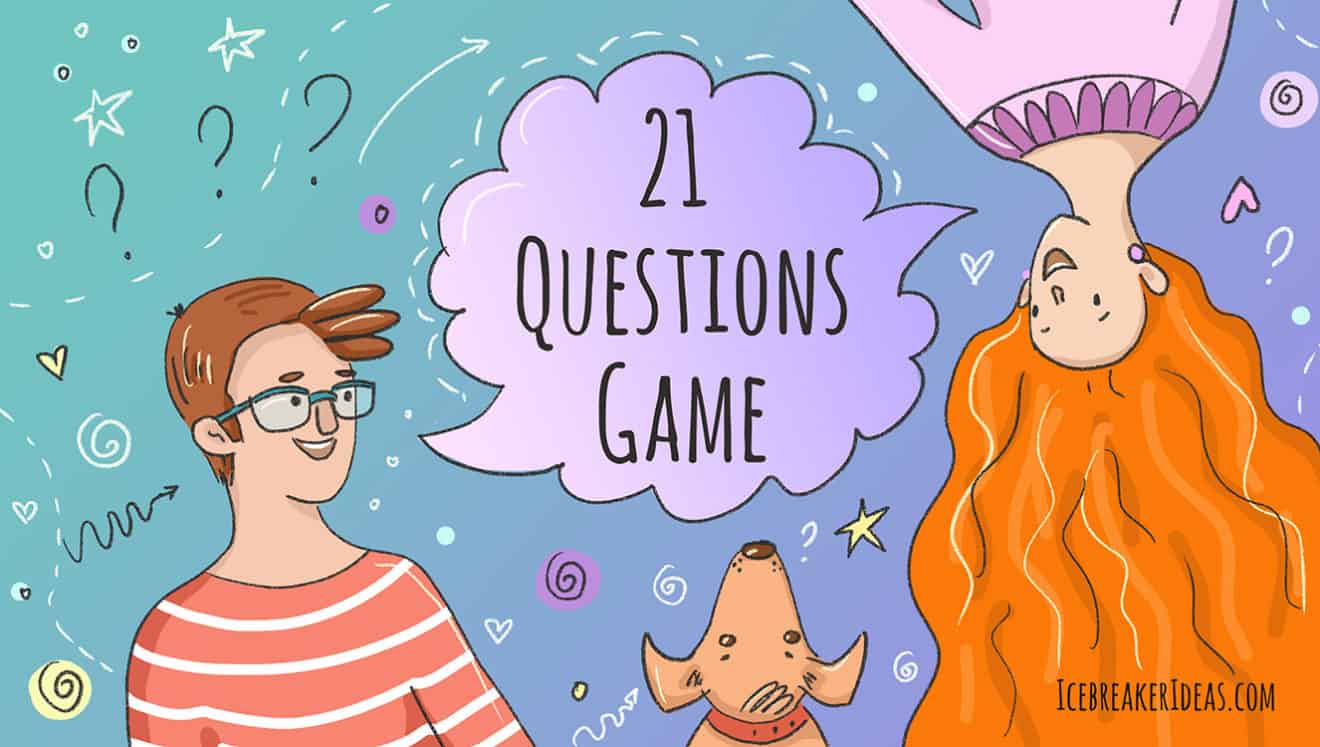The origin of the game 21 Questions probably is related to the American game show Twenty-One, which originally was hosted by Jack Barry and aired on NBC from 1956 to 1958. Contestants answered questions from various categories, with the goal being to reach a score of twenty-one.
Table of Contents
In this article, we will introduce you to a simple, player-friendly version of the 21 Questions Game and tell you how to play it, including the rules. Then we will present “21 Questions for a New Relationship,” “21 Questions to Ask a Girl,” and “21 Questions to Ask a Guy.”
You can also create your own game of twenty-one questions by choosing any category and making up questions to ask. Cleverness is the key to having fun playing this game!
21 Questions Game
Playing the game of 21 Questions works in many different environments. The game works well as an ice breaker at parties, to introduce a newly formed group of people to each other, in the schoolroom, at camps – anywhere a group of people have gathered. It can also be used as a family game or played by just two people. One can make up questions specific to a particular situation or category in advance, or spontaneously create questions, building on those already asked. The many different ways of playing 21 Questions makes it a game perfect for any time or any place.
How to Play 21 Questions
Step 1 – Define Your Game
The first step is to decide what type of 21 Questions game you wish to play. Consider the following:
- Do you want to create questions ahead of time, or spontaneously ask questions?
If you are creating questions ahead of time, you have a bit more control over the game contents. However, in some situations, you may find it better and more fun to spontaneously ask questions that build upon each other. - Are you playing with people you know or people you wish to find out more about?
Playing with people you know means your questions can be a bit more personal. If you are playing with people you know only slightly or wish to know more about, the content and nature of your questions may need to be more general and objective. - Where and with whom are you playing?
Are you at a party, at work, in a classroom, etc.? If you are playing with children, the questions will be vastly different than if you are playing with adults. Additionally, your questions need to be framed for your audience. A Bible class will require much different questions than a swinging, Friday-night party.
Step 2 – Define Your Rules
Before you begin playing 21 Questions, you should define the rules for the game. We suggest the following:
- Be respectful.
Do not rush the answers and treat the other player(s) the way you wish to be treated. - Decide if you will have some off-limit questions.
Before you begin playing, identify what questions or types of questions should not be asked. Those that are crude, inconsiderate, or may hurt someone’s feelings are examples. - Create rules for if and how a player can pass on a question.
You may wish to only allow one or two passes for each player. Substitute another question for the one they choose not to answer.
Step 3 – Pick Your Question Format
Begin by creating some guidelines about the kinds of questions you will ask and answer. For example, will they deal with a certain theme? Will they be long or short, personal or impersonal? Then follow these steps to create a list of questions:
- Begin with some basic and simple questions.
For example, you might begin with “Where were you born?” These questions will build a good foundation of trust for your game. - Favorite questions work well and are not too personal.
A question such as “What is your favorite color?” works well at the start of the game. - Do not forget to include some silly or humorous questions.
These questions will lighten the mood and add to the fun of the game. - Consider asking “what if?” questions.
Questions such as, “What if you were rich all of a sudden?” are broad and interesting to ask. - Questions about family help players learn about each other.
When you ask about family members, be sensitive to feelings and avoid being too personal while gleaning information. - Ask about goals and aspirations.
A question such as “What did you want to be when you grew up?” is fairly simple. Whereas, “Where do you see yourself in ten years?” is a bit more probing and personal. - Choose some serious questions.
Questions about money, religion, or politics may not be suitable for a group 21 Questions game, but may work for a two-person game when you want to get to know someone really well.
Remember, build upon questions you have already asked and answers received.
Step 4 – Pick the First Person to Ask Questions
If you are playing a two-person game, it may be possible to simply agree on which person goes first. If not, or if you are playing in a group, you can use one of the following methods to choose the first person to ask questions:
- Coin toss
A simple coin toss with each person calling out “Heads!” or “Tails!” denotes the first player on a two-person game. - Dice Roll
Simply have players roll dice and the person with the highest (or lowest) number goes first.
In a larger group, either pair up the players for a 21 Questions game or designate the first person and go around a seated circle of players.
Alternative method of playing for a very large group:
If your group is very large, you can pass the question sheet on a clipboard and a pen or pencil around the circle. Each player will ask the player to their left a chosen question from the list and put a mark next to the question they have asked. Play continues until all players have asked and answered one of the twenty-one questions.
21 Questions for a New Relationship
21 Questions is a great way to get to know someone better. You need to be sensitive to the reactions of the person with whom you are playing. Make sure you let them pass on a question they are not comfortable answering. Lack of sensitivity can ruin a new relationship if one is not careful. We have chosen questions that will help you get to know someone without potentially causing problems. We also start with some pretty simple, basic questions and move to those that are a bit more personal and probing.
- What is your favorite type of music?
- What is a hobby or activity you have always wanted to try?
- Would you rather cook and eat at home or eat out? Why?
- What do you like to do when you are alone?
- Are you an early bird or a night owl?
- Would you rather live in the mountains or by the sea?
- What do you consider to be your hidden talent?
- What is an accomplishment you are most proud of?
- What do you like to do on a rainy day?
- What do you hate to spend money on?
- Would you consider yourself an extrovert or an introvert?
- What do you want most out of life?
- If you could spend your time anywhere doing anything you wanted, where would you be and what would you do?
- What is the scariest thing that ever happened to you as a child?
- How would you like to spend your birthday (or another holiday, such as Christmas or Valentine’s Day)?
- What is one thing people would never know (know right away) about you just by seeing you?
- When and where are you the most comfortable and able to really be yourself?
- How do you deal with people you really dislike?
- How close are you to your family?
- What qualities do you think make someone a decent human being?
- How do you show someone you love them
21 Questions to Ask a Girl
Sometimes it is difficult to get a conversation going with a girl you like or have an interest in. Playing a fun game of 21 Questions provides a non-threatening way to get her talking and find out more about her. Keeping this in mind, you will note we begin with some light-hearted, fun questions, and continue with others that are a bit more probing. The last few questions a more personal and should illicit more than a short response, which should lead to some good, relationship-defining conversation.
- What is your full name and does it have any special origin or meaning?
- What game was your favorite when you were a child?
- Do you have a pet (or pets)?
- Which do you like better, dogs or cats?
- Is there anything you would like to change about yourself? Why?
- What did you dream of doing when you grew up? Do you still have the same dream?
- What do you do when someone annoys you for no reason?
- What are you afraid of and why?
- What would you do if you won the lottery or became rich in another way?
- What is the worst (best) job you ever had?
- What was the your most embarrassing moment?
- Do you like to drive or be the passenger?
- What is the most exotic place you have ever visited or food you have eaten?
- Would you rather spend the day inside vegging out, or outside participating in some activity?
- Do you play any internet or video games? Which ones?
- Which would you rather do, read the book or watch the movie made from the book?
- What kind of music do you enjoy listening to: hard rock, jazz, classical, rap, etc.
- What is your ideal date (place, time, etc.)?
- Is there anything a guy might do that would be an instant turn-off?
- What would be the perfect date?
- What is your political ideology (religious beliefs)?
21 Questions to Ask a Guy
The questions to ask a guy are vastly different from those you would ask a girl. Like it or not, the two genders are very different. 21 Questions to Ask a Guy makes a few basic, general assumptions:
- Guys may be more hesitant about sharing personal information.
- Guys may not be as talkative as girls.
- Most guys are less emotional than girls.
Therefore, we have started our list with some non-threatening, simple questions. Most of these questions do not require lengthy answers and are mostly fact-based and relatively objective. Then we have some more detailed questions, and we end the list with some that will disclose more personal information.
- What is your favorite movie?
- What is your favorite book?
- What is your favorite food?
- What is your favorite song?
- Do you take vacations and where do you go?
- What is the best gift you have ever received?
- What are four items on your bucket list?
- Where were you born?
- What makes you happy?
- How would your best friend describe you?
- What is your favorite childhood memory?
- How many people are in your family and what is your family like?
- If you could have one superpower, what would it be?
- If you could change one thing about yourself, what would it be?
- What is it that you enjoy the most about your job? The least?
- Where do you see yourself in five years (ten years)?
- If you could travel anywhere, where would you go?
- If you could live the rest of your life anywhere in the world, where would it be?
- What is your definition of a perfect date?
- Do you believe in love at first sight?
- What are you looking for in a relationship?
Now you are ready to ask questions of just about anyone. Use one of our lists on that first, very special date or play the 21 Questions Game to provide fun in a group situation. Once you are familiar with the game, try making up your own questions. If is fun to choose a specific category, such as questions about the Bible for a church youth get-together. You can even brain-storm a list with your group or partner to get questions you are all comfortable answering. Whatever questions list or format you choose, have fun!

Susan majored in English with a double minor in Humanities and Business at Arizona State University and earned a Master’s degree in Educational Administration from Liberty University. She taught grades four through twelve in both public and private schools. Subjects included English, U.S. and world history and geography, math, earth and physical science, Bible, information technologies, and creative writing.
Susan has been freelance writing for over ten years, during which time she has written and edited books, newspaper articles, biographies, book reviews, guidelines, neighborhood descriptions for realtors, Power Point presentations, resumes, and numerous other projects.














![30 Fun Field Day Games and Activities [for Kids & Adults]](https://icebreakerideas.com/wp-content/plugins/special-recent-posts/cache/srpthumb-p6267-100x100-no.jpg)


